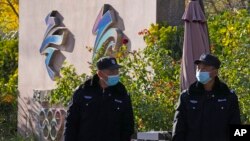As South Korea decides whether or not to join the Biden administration's diplomatic boycott of the Beijing Winter Olympics, experts said its decision could signal its commitment to Washington's coalition-building strategy centered on human rights.
A senior official at the South Korea’s Blue House presidential office, who preferred to remain anonymous due to the sensitivity of the subject, told reporters Seoul has not made any decisions on whether to send diplomatic representatives to the Beijing Olympics.
When the United States announced the boycott, it specified the move was to protest China's human rights violations.
Evans Revere, a formal State Department official with an extensive experience negotiating with North Korea, said South Korea “will have to make its own decisions, but as a U.S. ally and a country that nominally stands for human rights and human freedoms, Seoul will have to think carefully about the message that its high-level attendance at the Beijing Games would send.”
Revered continued, “It’s fair to say that Washington would not welcome such participation.”
Prioritizing human rights
White House press secretary Jen Psaki announced Monday the Biden administration will not send any diplomatic representation to the Beijing Olympics due to China’s “ongoing genocide” against the Muslim Uyghur minority group in its western Xinjian region.
In response, Chinese Foreign Ministry spokesperson Zhao Lijian said Tuesday that “the U.S. should stop politicizing sports and stop disrupting and undermining the Beijing Winter Olympics.”
Lijian continued, “The U.S. has been fabricating the biggest lie of the century about so-called ‘genocide’ in Xinjian” and promised Beijing “will respond with firm countermeasures.”
VOA’s Korean Service asked the Chinese Foreign Ministry and Beijing’s Olympics Organizing Committee if South Korea had been sent an invitation to the games but received no responses.
The Biden administration has put “the protection of human rights” at the center of its foreign policy since taking office this year, according to the U.S. State Department.
Australia, Canada, and the United Kingdom joined Washington’s diplomatic boycott of the games this week citing alleged human rights abuses in Xinjiang as a reason.
Experts said if South Korea’s President Moon Jae-in decides to attend the Beijing Olympics or send diplomatic representation, he could face criticism.
Scott Snyder, director of the program on U.S.-Korea Policy at the Council on Foreign Relations, said Moon’s attendance “would be greeted … negatively.”
Patrick Cronin, Asia-Pacific security chair at the Hudson Institute, said of Moon, “It would be ironic if a human rights lawyer whose parents fled communism in search of freedom allowed himself to provide cover for the persecution of minorities in Xinjian and Tibet and for the crackdown on democratic rights in Hong Kong.”
Cronin continued, “At this point in his tenure, President Moon should be asking whether a closer relationship between Beijing and Pyongyang is in the national security of South Korea.”
After Moon held a summit with President Joe Biden in May, the two agreed their commitment toward a “vision for a region governed by democratic norms, human rights and the rule of law at home and abroad.”
Delicate balancing act
At the same time, however, the Moon government has been trying to use the Beijing Winter Olympics as a venue to revitalize the currently stalled inter-Korean peace process much as the 2018 Pyeongchang Winter Olympics held in South Korea became a stage for inter-Korean reconciliation.
South Korea’s Unification Minister Lee In-young in October said, “We hope that through the Beijing Winter Olympics, we can work to find opportunities for the restoration of inter-Korean relations and a ‘new leap forward for peace.’”
Suh Hoon, Moon’s national security adviser, sought Beijing’s support for a formal declaration to end the Korean War when he met with Yang Jiechi, Chinese Communist Party’s Politburo member, in China’s eastern city of Tianjin last week.
Harry Kazianis, senior director of Korean Studies at the Center for the National Interest, said, “The U.S. should not get upset or disappointed at President Moon” if he decides to attend the Beijing Olympics, “as he is the leader of a nation that has an economic relationship with China worth hundreds of billions of dollars and is a security ally of the United States.”
Robert Manning, a senior fellow at the Atlantic Council, said, “While the U.S. would not be happy, especially if most U.S. allies also boycott official presence at the Olympics, I think the White House understands the sensitivities Moon must navigate in dealing with China.”
Joseph DeTrani, who served as special envoy for six-party denuclearization talks with North Korea during the administration of George W. Bush, said, “South Korea, obviously needs to make its own decision on official representation at the Winter Olympics, based upon its relationship with China and its own approach for voicing concern about these human rights abuses.”
Hyungjin Kim contributed to this report from Seoul.




